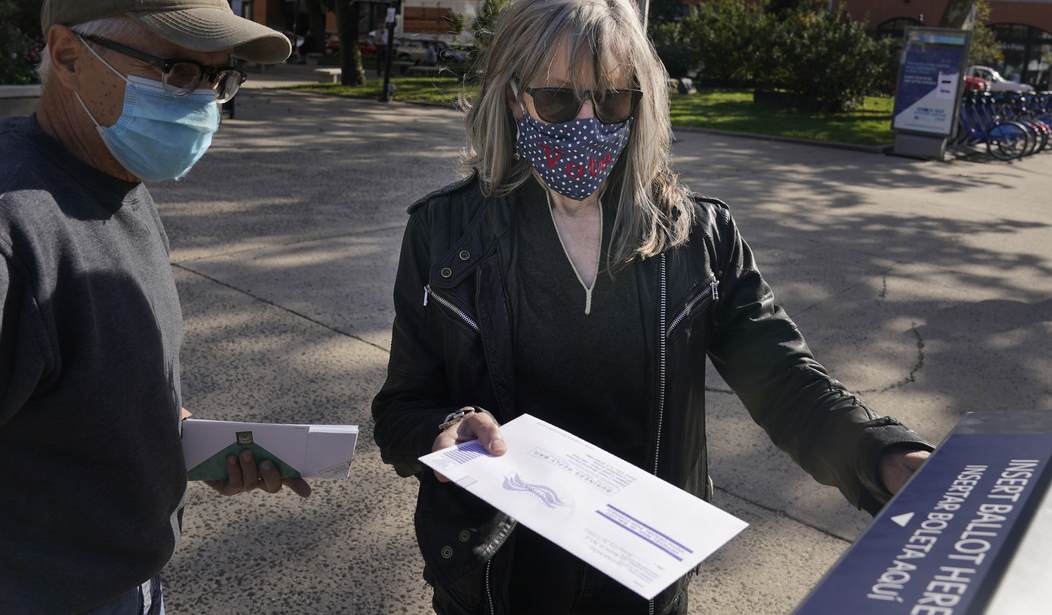While hosting Ukrainian President Volodymyr Zelenskyy and several European leaders at the White House to seek peace in Eastern Europe, President Donald Trump addressed domestic concerns about election integrity, saying he is “going to do everything possible” to “get rid of mail-in ballots.”
“I am going to lead a movement to get rid of MAIL-IN BALLOTS,” Trump posted to social media before the high-level meeting. “We're going to start with an executive order that's being written right now by the best lawyers in the country to end mail-in ballots because they're corrupt,” Trump plainly stated.
Trump’s skepticism of mail-in voting is more than warranted.
Most first-world nations have banned mass mail-in voting because it is neither safe nor secure and almost certainly results in illegal ballots being cast and counted.
Europe, for example, has banned mass mail-in voting across the continent for decades.
In 1975, France banned mail-in voting after several scandals showed the susceptibility of fraud was too high to ignore. In 2005, the United Kingdom made mail-in voting illegal after six councilors in Birmingham were convicted of organizing a “massive, systematic and organized” postal voting fraud campaign.
Among the 27 countries in the European Union (EU), 17 have eliminated mail-in voting unless the citizen lives overseas. In six nations that do allow mail-in voting, voters are required to present photo identification to receive a mail-in ballot. In six others, mail-in voting has been outlawed.
Recommended
Among the 16 non-EU nations in Europe, every single one has banned mail-in voting for those citizens who do not live abroad, and every single one also requires photo identification to obtain a mail-in ballot.
Only a few of the 38 nations in the Organization for Economic Cooperation and Development (OECD) allow limited mail-in voting, such as Japan and Poland. However, in order to vote by mail in these countries, one must be disabled and present documentation to confirm they are indeed unable to vote in-person.
In 2005, former President Jimmy Carter and former U.S. Secretary of State James Baker issued a report titled, “Building Confidence in U.S. Elections,” in which they noted that mail-in voting “increases the risk of fraud” and “absentee balloting…has been one of the major sources of fraud.”
Three years later, The New York Times ran an article titled, “Error and Fraud at Issue as Absentee Voting Rises,” which similarly concluded that “votes cast by mail are less likely to be counted, more likely to be compromised and more likely to be contested than those cast in a voting booth.”
Even NPR admitted in mid-2020 that “Mail-in voting…is fraught with potential problems.”
In the 2020 presidential election, a record-high 46 percent of voters cast ballots by mail.
Unfortunately, the 2020 presidential election was also likely tainted by widespread illegal mail-in voting.
For more details on how prevalent illegal mail-in voting was in the 2020 election, simply read The Heartland Institute’s policy study, “Who Really Won the 2020 Election? Measuring the Effect of Mail-in Voter Fraud in the Trump-Biden Race for the White House.”
Here are the headlines:
In the 2020 election, 21 percent of mail-in voters admitted they voted in a state where they are “no longer a permanent resident.” Another 21 percent of mail-in voters admitted that they filled out a ballot for a friend or family member. Nearly 20 percent said that a friend or family member filled out their ballot, in part or in full, on their behalf. And 17 percent said they signed a ballot for a friend or family member “with or without his or her permission.”
In total, 28.2 percent of all mail-in respondents admitted to committing at least one type of fraud in the 2020 election.
To be clear, both parties benefited from illegal votes in the 2020 election.
Before the 2020 election, the vast majority of Americans had faith that elections were “run and administered well or somewhat well.”
America needs ironclad election integrity. The best course of action to achieve robust election integrity is for state lawmakers to impose sound election rules that prevent the possibility of illegal voting from occurring in the first place.
A few examples include preventing “no excuse” mail-in voting, requiring signature verification and/or a notarized signature on mail-in ballots, outlawing ballot harvesting, requiring able-bodied voters to vote in person, and imposing harsh penalties for those who vote illegally.
Trust me, we don’t want to live in a nation in which the side that cheats the best ends up winning the election. That is a recipe for disaster.
Chris Talgo (ctalgo@heartland.org) is editorial director at The Heartland Institute.
Editor's Note: President Trump is leading efforts to make U.S. elections safe and secure.
Help us continue to report on President Trump's successes. Join Townhall VIP and use promo code FIGHT to get 60% off your membership.
























Join the conversation as a VIP Member